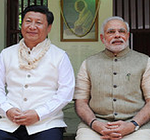As China’s president Xi Jinping unraveled his transcultural strategies during his current visit to India and other South Asia countries, he has proposed a prepossessing “China formula” to his neighbours, which includes market access for India’s IT industries, gargantuan investment initiatives in infrastructure, smoothed up pilgrimage route along Sino-India borders and new campaigns to boost India’s tourism industry.
Given India’s problems – uneven development, scarcities of resources – no one should be undermining the importance of the bilateral with China. There is certainly a lot that India can learn from this neighbour.
However, there have been some concerns regarding the “expansionism” intent that has increasingly gained traction relating to China’s international presence, and many are adopting a very cautious approach vis-a-vis China’s inbound investment package. Behind these reservations are very realistic concerns: China’s impressive GDP growth rate at 7.7% between 2009-2013 is reflective of how well the economy is doing, but the resultant rampant industrialisation has also caused huge environment problems for the country.
China still ranks as one the most polluted countries in the world. The long term GDP-centric development mentality coupled with compromising environment standards has spawned pernicious results: a recent article in the Atlantic highlighted the fact that as recently as 20 years ago, there were an estimated 50,000 rivers in China, each covering a flow area of at least 60 square miles. Today, according to China’s First National Census of Water, more than 28,000 of these rivers have disappeared. To put this number into context, China’s lost rivers are almost equivalent, in terms of basin area, to the United States losing the entire Mississippi River.
Therefore, if China is really serious about fostering good relations with other nations it should become a part of the Silk Road Belt and the oceanic Silk Road as a confidence building measure. Also, the Chinese government needs to finalise green details of outbound strategies, technologies, investment and development mentalities, offering upgraded “Green Silk Road” toolkits to the new trading partners in the Silk Road Economic Belt.
The India-China bilateral can also benefit from this mechanism. China and India can work together on the conservation and preservation of the cornucopia (fauna, flora and cultural diversities) in Himalaya mountain ridges and expanding water receiving regions of international watersheds.
Before any institutionalised collaboration and deliberation comes into shape at governmental level, the academia and civil societies in these regions should be mobilised to create a free flow of information and possibilities of knowledge convergences. Following the paradigm of “Ivy League”, countries in the Silk Road Economic Belt should at least attempt to establish the Silk League Knowledge Group Consortium, mapping out the green and strategic before a regional economic campaign is set into motion.
The Green Silk Road toolkits, if they don’t only remain at the level of ingenious concoctions, should first respond to the worsening ecological menaces faced by various regions like China’s metropolises and western provinces, Minor Asia regions, South Asia countries, and ASEAN countries.
The Silk Road Resurrection Initiative should not be rolled out in the manner akin to frenzied development projects but as a green and reflexive modernisation efforts.
Zhou Lei is a researcher at the Collaborative Innovation Center of South China Sea Studies in China.
This blog was exclusively written for Gateway House: Indian Council on Global Relations. You can read more exclusive content here.
For interview requests with the author, or for permission to republish, please contact outreach@gatewayhouse.in.
© Copyright 2014 Gateway House: Indian Council on Global Relations. All rights reserved. Any unauthorized copying or reproduction is strictly prohibited


